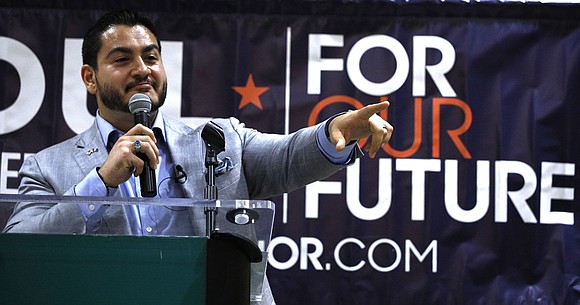Abdul El-Sayed hopes to keep progressive wave rolling in Michigan
CNN/Stylemagazine.com Newswire | 8/7/2018, 9:13 a.m.

By Gregory Krieg, CNN
(CNN) -- The odds are against him. History, too.
But if Abdul El-Sayed, in his quest to become the country's first Muslim governor, can upset frontrunner Gretchen Whitmer in Michigan's Democratic primary on Tuesday, he will do more than earn his shot at carving out a piece of political history: He will upend the conventional wisdom within the party establishment that says progressive left politics are a loser with Midwestern voters.
Michigan Democrats' race to replace the term-limited Republican Gov. Rick Snyder, one of the few ideologically and personally combative of the season, is a three-way fight featuring former state Senate minority leader Whitmer, the young leftist firebrand El-Sayed and millionaire self-funder Shri Thanedar.
El-Sayed, a 33-year-old former Detroit health commissioner championed by Sen. Bernie Sanders and Alexandria Ocasio-Cortez, has emerged as a favorite of the rising progressive insurgency with his detailed pitches for statewide "Medicare for all," public internet and tuition-free college.
But it is Whitmer who enjoys the support of leading Michigan Democratic establishment figures, along with the state's biggest unions and, as of last week, New York Sen. Kirsten Gillibrand. A liberal in good standing from her time in the state legislature, Whitmer has pitched herself as the safer hands in this contest, calling El-Sayed's single-payer plan "not realistic in Michigan at this moment" while touting her work to help secure a Medicaid expansion deal with Republicans back in 2013.
A contentious primary
Their most recent and heated tussle has centered on the question of corporate PAC money -- Whitmer accepts it, El-Sayed does not.
Over the past few days, he has accused her -- not for the first time -- of being bought off by the state's largest insurer, while she is charging that his campaign has fallen short of its own standards.
The debate turned nasty last Thursday, when El-Sayed in a tweet linking to a Crain's Detroit Business report on the more than $500,000 in "untraceable" money given to a political organization that has run ads supporting Whitmer, compared the practice to "money laundering." That language -- deleted and amended to "a legal form of money laundering," which has also since been erased -- quickly escalated what was already shaping up to be a tense run-in.
Early Friday, Whitmer's campaign zeroed in on filings that showed a PAC run by state Rep. Abdullah Hammoud gave more than $60,000 to El-Sayed's campaign shortly after receiving a cash infusion from donors who had already given it the individual maximum.
A spokeswoman responded to the news by accusing El-Sayed of "running a potentially illegal donor funneling scheme," and suggested he had "stooped to the level of Donald Trump by peddling conspiracy theories and making defamatory attacks on Twitter." (There is no clear evidence that El-Sayed, the donors or Hammoud's PAC violated campaign finance rules.)
El-Sayed sought to take down the temperature later in the day, tweeting that he admired Whitmer's work and pledged that the two "will walk in lockstep, whoever wins, to a blue wave in November."
For now, though, El-Sayed and other Whitmer critics are keeping up the charge that her opposition to "Medicare for all" has been influenced by allies at Blue Cross Blue Shield. Executives who run the insurer's PAC organized a fundraiser for Whitmer earlier year, netting her campaign $144,000. In a recent interview with The Nation, El-Sayed alleged that it "bought her silence on single-payer."
During a canvassing event last week, Whitmer called those attacks "phony," adding that it was "extremely sexist to say that a woman is beholden to her father's former employer." Her father, Richard Whitmer, was the insurer's chief executive from 1988 to 2006. El-Sayed has steered clear of making a direct connection. Others have been less careful.
Whitmer insists she backs "universal coverage" but also called it "deceptive to pretend a governor can count on two waivers from the Trump administration, and a constitutional amendment and a hundred billion dollars."
Asked about that logic, El-Sayed's campaign said, "Senator Whitmer here clearly shows that Blue Cross Blue Shield has written her talking points on health care."
Though they have mostly focused on each other as the primary nears, both El-Sayed and Whitmer have also been the target of (expensive) broadsides from Thanedar, whose bid appears to be losing steam amid controversies surrounding his business practices and a report that he considered running as a Republican before turning around and pitching himself to Democrats as "a fiscally savvy Bernie."
Sanders' candidate
In an interview last week, El-Sayed compared his campaign to the one Sanders, who sung his praises at a pair of rallies this weekend in Michigan, ran a couple years ago.
"(Sanders) inspired people to believe in his message because they knew he wasn't bought by corporations and he wasn't proposing halfway measures," El-Sayed said. "We're doing exactly the same thing."
The son of Egyptian immigrants, El-Sayed has also fended off suggestions that, in a state won by President Donald Trump two years ago, he would be at a disadvantage in a general election.
His message to the doubters: "Barack Hussein Obama won twice, and Bernie just won his primary, so I'm your best bet if you want to win a primary or a general."
Whitmer's argument, highlighted by a recurring promise to "Fix the damn roads" and reminder she alone among the candidates can stake a claim to expanding health care in the state, is more utilitarian.
"Michigan's not an overwhelmingly extreme left state or extreme right state," she said in an interview last week. "We're a state full of people that just want our government to work."



